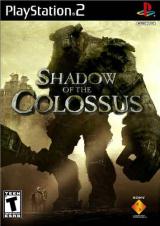Fumito Ueda was an artist, a graduate of the Osaka University of Arts who subsequently taught himself to create CGI animation at the highest level. When Sony brought him on board, he prepared a few minutes of video showing an enormous labyrinthine castle, a small but agile boy, and a wispy but mysterious princess. The castle was alternatively saturated in sunlight or hidden in shadow, and the boy's shy but powerful character came through without dialogue, simply in the way that he moved. "I want to make this game," he told them.
Of course, Ueda had no experience actually building games. But for Kenji Kaido, it was old hat. He'd spent ten years producing titles for Taito, even going so far as to build a home karaoke machine and coin-op games, and had recently joined Sony where he designed and produced Ape Escape. Kaido saw Ueda's trailer and was immediately enthralled: he saw potential to create something huge. Sony named Kaido producer and together the pair set out to make gaming history. It took four long years, but that short trailer eventually became the critically-acclaimed ICO, one of the most memorable titles for the PlayStation 2. More recently, the pair have just recently released Shadow of the Colossus, one of 2005's best.
Although the games created by this influential pair of designers have inspired developers around the world, it's rare for them to make an appearance in the U.S. So it was a particular treat to see them at the 2006 D.I.C.E. show in Las Vegas, where Lorne Lanning (member of the AIAS Board and founder of Oddworld Inhabitants) chatted with them on stage via an interpreter to help close out the show. Over the course of an hour, it was a fascinating look at how truly great games are created.
Art of the Highest Standards
We were surprised to learn that the team that created ICO consisted of just 20 artists and programmers (the Shadow team consisted of only 35). Fumito Ueda himself took on the role of lead designer, lead artist, and creative director. Lanning asked why the artist wanted to take on all the roles for himself, and Ueda replied that they just couldn't find the right people to make his vision come alive. He would've liked to have worked less - "Sometimes I didn't even get to go home," he admitted. Producer Kenji Kaido confessed that he didn't go home either when the artists stayed late - saying it wasn't right to abandon them. Developers in the crowd cheered; there's definitely a different culture in the U.S.
Ueda is a perfectionist, with a crystal clear vision of exactly what he wanted from his games. Lanning asked if his insistence on being the sole artistic and creative lead caused any bottlenecks in the production, and Ueda and Kaido admitted that that was the case. "That's why our games take so long!" they said.
After ICO was finished, the pair put out a call for more artists. They placed ads in the Japanese press and spread the word. Of the 500 applicants, Kaido felt that only ten were up to the quality that the team needed. Ueda was even more picky, feeling that only 1 or 2 met his standards.
Maintaining team morale in such circumstances was difficult. Four years is a long time to stay attached to a project. Lanning asked how the pair of developers kept spirits high, and Kaido said it's best to give people a series of smaller objectives to hit so that they always keep a sense of accomplishment. Kaido explained that it was very hard to keep morale high whenever Ueda wanted something to be redone. Ueda accepted nothing less than perfection in every piece of art and animation: he'd frequently demand sweeping changes until the art team got it 'just right.' That's when morale was at its lowest. But Kaido said that people knew the end product was better for it, and that the team felt proud once major changes had been completed and approved. They could see how much better the game was for it.
Ueda's struggle for perfection moved the audience -- after the presentation, an American developer turned to me and said, "We're all brewing beer in the basement, these guys are growing grapes and making wine."






